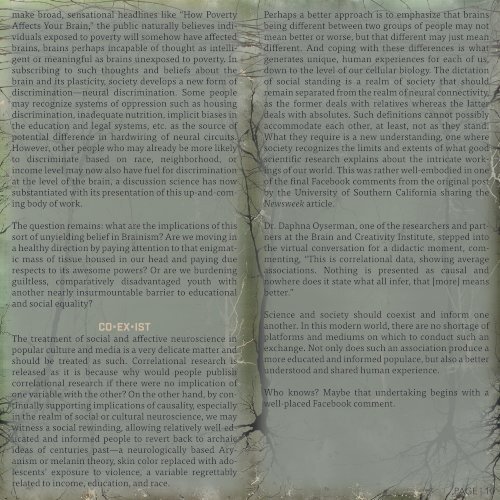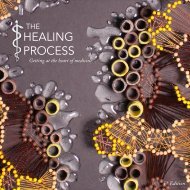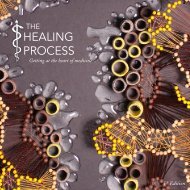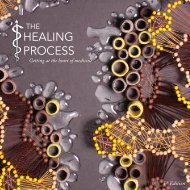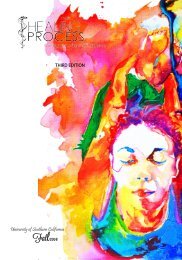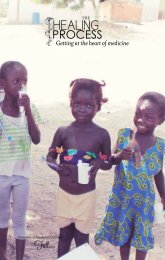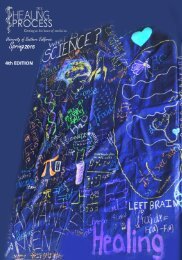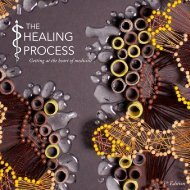final_thp_5thedition
Create successful ePaper yourself
Turn your PDF publications into a flip-book with our unique Google optimized e-Paper software.
make broad, sensational headlines like “How Poverty<br />
Affects Your Brain,” the public naturally believes individuals<br />
exposed to poverty will somehow have affected<br />
brains, brains perhaps incapable of thought as intelligent<br />
or meaningful as brains unexposed to poverty. In<br />
subscribing to such thoughts and beliefs about the<br />
brain and its plasticity, society develops a new form of<br />
discrimination—neural discrimination. Some people<br />
may recognize systems of oppression such as housing<br />
discrimination, inadequate nutrition, implicit biases in<br />
the education and legal systems, etc. as the source of<br />
potential difference in hardwiring of neural circuits.<br />
However, other people who may already be more likely<br />
to discriminate based on race, neighborhood, or<br />
income level may now also have fuel for discrimination<br />
at the level of the brain, a discussion science has now<br />
substantiated with its presentation of this up-and-coming<br />
body of work.<br />
The question remains: what are the implications of this<br />
sort of unyielding belief in Brainism? Are we moving in<br />
a healthy direction by paying attention to that enigmatic<br />
mass of tissue housed in our head and paying due<br />
respects to its awesome powers? Or are we burdening<br />
guiltless, comparatively disadvantaged youth with<br />
another nearly insurmountable barrier to educational<br />
and social equality?<br />
co•ex•ist<br />
The treatment of social and affective neuroscience in<br />
popular culture and media is a very delicate matter and<br />
should be treated as such. Correlational research is<br />
released as it is because why would people publish<br />
correlational research if there were no implication of<br />
one variable with the other? On the other hand, by continually<br />
supporting implications of causality, especially<br />
in the realm of social or cultural neuroscience, we may<br />
witness a social rewinding, allowing relatively well-educated<br />
and informed people to revert back to archaic<br />
ideas of centuries past—a neurologically based Aryanism<br />
or melanin theory, skin color replaced with adolescents’<br />
exposure to violence, a variable regrettably<br />
related to income, education, and race.<br />
Perhaps a better approach is to emphasize that brains<br />
being different between two groups of people may not<br />
mean better or worse, but that different may just mean<br />
different. And coping with these differences is what<br />
generates unique, human experiences for each of us,<br />
down to the level of our cellular biology. The dictation<br />
of social standing is a realm of society that should<br />
remain separated from the realm of neural connectivity,<br />
as the former deals with relatives whereas the latter<br />
deals with absolutes. Such definitions cannot possibly<br />
accommodate each other, at least, not as they stand.<br />
What they require is a new understanding, one where<br />
society recognizes the limits and extents of what good<br />
scientific research explains about the intricate workings<br />
of our world. This was rather well-embodied in one<br />
of the <strong>final</strong> Facebook comments from the original post<br />
by the University of Southern California sharing the<br />
Newsweek article.<br />
Dr. Daphna Oyserman, one of the researchers and partners<br />
at the Brain and Creativity Institute, stepped into<br />
the virtual conversation for a didactic moment, commenting,<br />
“This is correlational data, showing average<br />
associations. Nothing is presented as causal and<br />
nowhere does it state what all infer, that [more] means<br />
better.”<br />
Science and society should coexist and inform one<br />
another. In this modern world, there are no shortage of<br />
platforms and mediums on which to conduct such an<br />
exchange. Not only does such an association produce a<br />
more educated and informed populace, but also a better<br />
understood and shared human experience.<br />
Who knows? Maybe that undertaking begins with a<br />
well-placed Facebook comment.<br />
PAGE | 10


